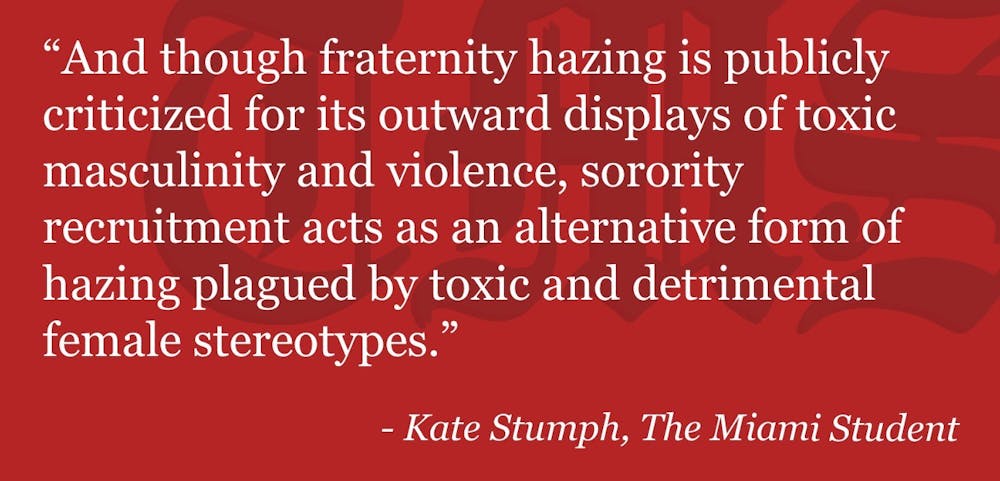When I went through informal recruitment, I had no idea what to expect or how my sorority would change me. That was a year and a half ago, and I now hold a position on my sorority’s executive board, and my primary role involves standards, excuses and chapter culture.
I had no idea what this job would entail when I was slated, and though I’m more than grateful for the opportunity, I wasn’t aware of the way it would change my view of certain Greek institutions. One of my primary roles is to accept recruitment excuses, and it’s my job to decide if the excuse is valid, and if so, the sister is excused.
However, I found myself shocked by the types of excuses I received. Without breaking confidentiality, I’ll say that approximately 50% of my sister's excuses related to mental health, and almost all of them provided me notes from medical professionals who had reservations about the grueling nature of sorority recruitment. I’ve spoken with my position’s counterparts in other chapters, and they experience the same phenomenon.
This begs the question — why is recruitment so detrimental to our mental health, and moreso, why do we actively participate in it when our goal is to foster positivity and sisterhood?
But at its core, sorority recruitment is its own form of hazing. Hazing is characterized by institutional forces and processes meant to bond people and create familiar experiences. Hence the “sisterhood” aspect of Greek life. And I’d be lying if I said that recruitment didn’t help me bond with other members of my sorority, but at what cost?
I recruited last year and spent most nights crying in my dorm room; my feet hurt, my schoolwork was neglected and the looks and constant disappointment of girls dropping took its toll on my mental health.
Asking impressionable and eager freshmen who are barely adults to take part in a process where they repeatedly face personal rejection can be especially traumatic. The long days are arduous, and it’s nearly impossible not to compare yourself to your peers. And the other side isn’t any easier.
And though fraternity hazing is publicly criticized for its outward displays of toxic masculinity and violence, sorority recruitment acts as an alternative form of hazing plagued by toxic and detrimental female stereotypes.
I don’t want to say the boys are doing it right, because there are issues inherent to their recruitment process as well, but last year, I watched my at-the-time boyfriend go out with his friends, keep up with his schoolwork and casually meet the boys who would later become his brothers, while I spent 16 hours a day in uncomfortable heels.
You don’t hear about fraternities accepting recruitment excuses for mental health, or really excuses at all. Though this could be chocked up to society’s dismissal of male emotion, I would argue their casual and less rigid attitude is healthier for their members.
We live in a time of drastic and rapid institutional change, and the Greek system is no exception. Greek life serves many purposes, both positive and negative, in the American college experience. But like other institutions, it’s been somewhat resistant to change, especially regarding inherent sexist, racist and elitist practices.
I love my sisters and my sorority and stand by my decision to go Greek. My sorority has taught me the value of adaptability, and I’m indebted to my sisters for supporting me through my own mental health journey. However, I also believe that we as a generation can update this archaic, sexist and ultimately detrimental system, and improve it for the sisters to come.




